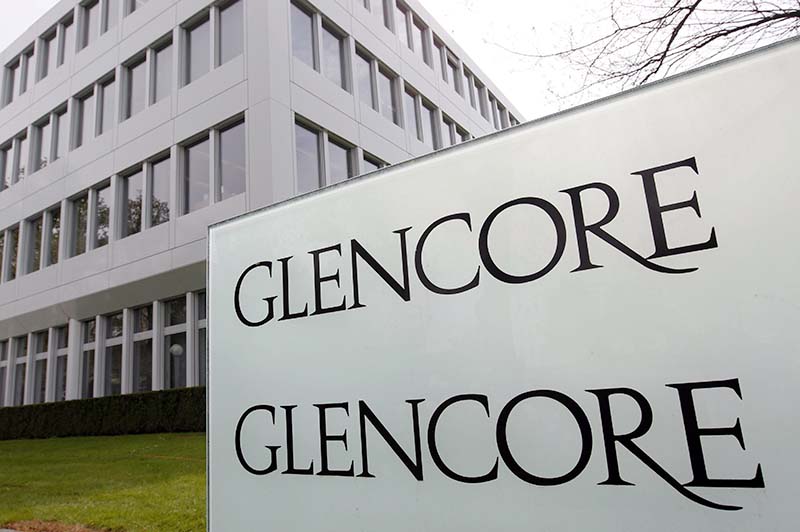UK court fines Glencore $308 million for bribing its way across Africa

Less than four weeks after South Sudan became an independent country in 2011, a delegation of Glencore Plc traders arrived by private jet in search of oil. They were carrying with them $800,000 in cash to pay bribes.
The revelation was among several detailed in a London courtroom this week that showed how, decades after Glencore founder Marc Rich created the popular image of commodity traders criss-crossing the globe to dispense bribes in exchange for lucrative contracts, remarkably little had changed in the way some traders at the company were doing business.
The UK Serious Fraud Office showed how Glencore paid more than $28 million in bribes across five African countries over five years to 2016, using methods that were in some cases carbon copies of deals that Rich had put in place in the 1970s and 1980s. On Thursday, a judge handed down a penalty of £276 million ($308 million) for Glencore’s conduct, on top of around $1.1 billion the company has already paid in related cases in the US and Brazil.
Glencore traders hand delivered large quantities of cash to government officials, they sought to profit from political turmoil, and they inserted themselves into government-to-government deals that had been negotiated at preferential rates.
In South Sudan, Glencore wasted little time. The east African country became independent on July 9, 2011. By July 21 a Glencore executive — identified by the SFO only as “GE7” and as the company’s Business Ethics Committee member for the London office — was on a plane “to persuade the President of South Sudan and others in government” to give Glencore’s joint venture there a contract to sell its oil.
Two other employees arrived in the capital Juba with $800,000 in cash a few days later. They said it was for “opening office in South Sudan, cash for office infrastructure, salaries, cars etc.,” but Glencore’s local agent in fact used some of it to pay bribes, the SFO said.
A few months later, the assistant to the President of South Sudan visited Glencore executives in Zurich and London. A Glencore executive withdrew a further $275,000 from the company’s “cash desk” at its Swiss headquarters, and the next day Glencore’s South Sudanese unit was offered an oil deal.
Commodity traders have spent years trying to distance themselves from the image of their industry forged in the days of characters like Marc Rich, instead presenting themselves as logistics businesses, moving oil, metals and grain from A to B in response to market signals.
But the revelations about Glencore’s trading in Africa come just six months after the London-listed company pleaded guilty in related US cases, while top oil trader Vitol Group admitted to paying bribes in three Latin American countries, and Brazilian prosecutors accused Trafigura Group of involvement in a kickback scheme, in a civil case. Trafigura has denied the allegations.
“The extremely sizeable cash sums that were permitted to be withdrawn from the offices in Switzerland, using such spurious descriptions as office expenses, demonstrates the most blatant of conduct,” Judge Peter Fraser said at the Southwark Crown Court on Thursday. “It demonstrates the number of people at Glencore who must have been complicit in this behavior.” An SFO prosecutor said Oct. 24 that as many as 11 former staff were under investigation for criminal wrongdoing.
“The corruption described is so brazen. This was less than 10 years ago,” said Alexandra Gillies, author of Crude Intentions, a book about corruption in the oil industry. “It’s critical that the executives and employees involved are held legally accountable. Bribery was clearly an embedded part of the company’s approach to maximizing profits in some of the poorest countries in the world.”
At the hearing attended by Glencore’s chair, Kalidas Madhavpeddi, the company’s lawyer said the company “unreservedly regrets the harm caused by these offenses.” Madhavpeddi declined to comment on the proceedings when approached by Bloomberg outside the court.
The SFO case outlined how in Nigeria, Glencore paid millions of dollars to an intermediary that were used to bribe officials at the state oil company, using sham contracts to disguise the true purpose of the payments. The Nigerian agent also transported cash by private jet to Cameroon. There a Glencore trader used it to bribe officials at the state oil and gas company and the state refinery.
In Malawi, Glencore used a playbook that Rich had pioneered 40 years earlier. In the 1980s, thanks to an enterprising employee who went by the pseudonym Monsieur Ndolo, the trading house inserted itself in a deal between the government of Iran and the government of Burundi, profiting from the interest-free payment terms that Tehran was willing to offer its poorer African ally.
In its case summary, the SFO detailed how Glencore had done something similar in a government-to-government oil deal between Nigeria and Malawi. Glencore traders and executives sanctioned bribes to officials at the Nigerian state oil company in order to take “take advantage of the ‘free credit’ benefit inherent in the joint venture agreement,” according to the SFO.
The SFO noted that Glencore had anti-corruption policies in place at the time of the wrongdoing, but said “these were largely ignored because corruption was condoned at a very senior level within the company.”
(By Jack Farchy and Jonathan Browning, with assistance from Thomas Biesheuvel)
{{ commodity.name }}
{{ post.title }}
{{ post.date }}




Comments